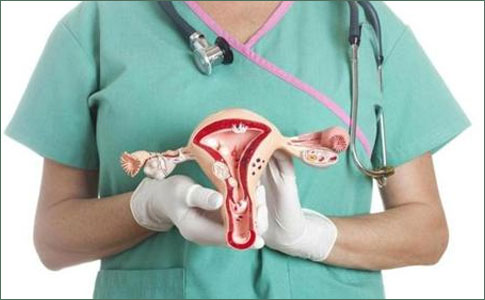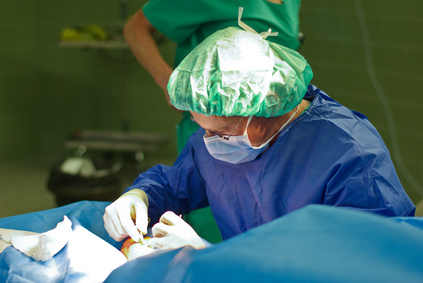Health Centers > Cancer Health Center > Ovarian Cancer
Ovarian Cancer
Ovarian cancer is cancer that forms in tissues of the ovary (one of a pair of female reproductive glands in which the ova, or eggs, are formed). Most ovarian cancers are either ovarian epithelial carcinomas (cancer that begins in the cells on the surface of the ovary) or malignant germ cell tumors (cancer that begins in egg cells).
Historically ovarian cancer was called the silent killer because symptoms were not thought to develop until the chance of cure was poor. However, recent studies have shown this term is untrue and that, in fact, the following symptoms are much more likely to occur in women with ovarian cancer than women in the general population:
- Bloating
- Pelvic or abdominal pain
- Difficulty eating or feeling full quickly
- Urinary symptoms (urgency or frequency)
Women with ovarian cancer report that symptoms are persistent and represent a change from normal for their bodies. The frequency and/or number of such symptoms are key factors in the diagnosis of ovarian cancer.
Epithelial Ovarian Cancer
- Introduction
- Etiology and Epidemiology
- Prevention
- Genetic Risk for Epithelial Ovarian Cancer
- Embryology
- Biology and Prognosis of Ovarian Neoplasms
- Classification and Pathology
- Patterns of Spread
- Clinical Features
- Diagnosis
- Screening
- Staging of Ovarian Cancer
- Treatment of Early Stage Ovarian Cancer
- Treatment of Advanced Stage Epithelial Ovarian Cancer
- Cytoreductive Surgery in Ovarian Cancer
- Chemotherapy for Advanced Stage Epithelial Ovarian Cancer
- Single Alkylating Agents
- Platinum Compounds
- Paclitaxel
- Docetaxel
- Other Doublets and Triplets
- Dose Intensification with Intravenous Chemotherapy
- Intraperitoneal Chemotherapy for Epithelial Ovarian Cancer
- Neoadjuvant Cemotherapy
- Radiotherapy in Advanced Invasive Disease
- Management of Advanced Invasive Ovarian Cancer
- Management of Advanced Borderline Tumors
- Assessment of Response in Patients who are Clinically free of Disease
- Survival of Patients with Advanced Ovarian Cancer
Ovarian Cancer
Ovarian cancer is one of the most treatable solid tumors, as the majority will respond temporarily to surgery and cytotoxic agents.
Nonepithelial Ovarian Cancer
Introduction
Germ Cell Malignancies
- Classification
-Epidemiology
-Clinical Features
Diagnosis
Epithelial Ovarian Cancer
Introduction
Etiology and Epidemiology
Prevention
Genetic Risk for Epithelial Ovarian Cancer
Embryology
Biology and Prognosis of Ovarian Neoplasms
Classification and Pathology
Patterns of Spread
Clinical Features
Diagnosis
Screening
Staging of Ovarian Cancer
Treatment of Early Stage Ovarian Cancer
Women who have these symptoms almost daily for more than a few weeks should see their doctor, preferably a gynecologist. Prompt medical evaluation may lead to detection at the earliest possible stage of the disease.
Other symptoms that have been commonly reported by women with ovarian cancer include: Fatigue, Indigestion, Back pain, Pain with intercourse, Constipation and Menstrual irregularities.
However, these other symptoms are not as useful in identifying ovarian cancer because they are also found in equal frequency in women in the general population who do not have ovarian cancer.
Nonepithelial Ovarian Cancer
- Introduction
- Germ Cell Malignancies
- Diagnosis
- Dysgerminomas
- Immature Teratomas
- Endodermal Sinus Tumors
- Embryonal Carcinoma
- Choriocarcinoma of the Ovary
- Mixed Germ-Cell Tumors
- Sex Cord-Stromal Tumors
- Granulosa-Stromal Cell Tumors
- Uncommon Ovarian Tumors
- Small-Cell Carcinomas
Warning signs of ovarian cancer
Abdominal bloating or swelling: The size of your abdomen increases, you feel bloated and full of gas. You might notice that some clothes feel tighter around your waist and hips.
Constipation and other changes in your bowel movements.
Pelvic pain: You feel discomfort or pain in the pelvic area, and sometimes also in the abdomen. If your pain persists, you shouldn't just brush it away, or mask it with painkillers. Your pain usually wants to give you an important message.
Low back pain, especially if it radiates to the pelvic area.
Urgent or frequent urination: You feel an urgent need to pee and you hardly make it to the toilet on time, and/or you need to urinate in short intervals. Many women experience this - it can often be a sign of weak pelvic floor muscles (which can be strengthen by Kegel exercises), or you might have a urinary tract infection. But keep an eye on it, as it can be a sign of something more sinister going on.
Loss of appetite or feeling full quickly when you eat: Also observe any unexplained weight loss. Women are usually happy when they shed a few pounds, but it's not always a good sign.
Pain with sexual activity
Fatigue: Feeling overly tired and low in energy can signal an underlying condition.
Risk factors
The exact cause of ovarian cancer is not known, but there are some risk factors that can increase your chances of ovarian cancer, so you should consider them.
Age: Women over the age of 50 are at greater risk of ovarian cancer. About 50 percent of ovarian cancers are diagnosed in women over 60. That of course doesn't mean that the disease doesn't occur in younger women too. For example, germ cell tumors are more common in younger women, but they are very rare.
Family history: If you have a family history of ovarian cancer, breast cancer or colon cancer that increases your chances of developing ovarian cancer. According to Mayo Clinic, the genes that increase the risk of ovarian cancer are called breast cancer gene 1 (BRCA1) and breast cancer gene 2 (BRCA2). These were initially connected with breast cancer, hence the name, but it has now been discovered that they are also responsible for ovarian cancer (http://www.mayoclinic.org/diseases-conditions/ovarian-cancer/basics/risk-factors/con-20028096). I've written a post in the past about 5 unconventional symptoms of breast cancers which you can read for further information.
Childbearing and menstruation: Women who have never given birth have a higher risk of developing ovarian cancer, and so do women who started menstruating early (before they were 12 years old), and/or reached menopause late (after 50). The number of periods you go through seems to be linked with your chances of getting ovarian cancer. For example, women who have more kids have a smaller risk of developing the disease.
Some medication: Taking hormone therapy after menopause, or using fertility treatment (long-term and large doses) can increase your chances of ovarian cancer. On the other hand, some studies show that oral contraceptive pills reduce the risk.
Other risk factors: These include smoking, obesity, use of an intrauterine device and polycystic ovary syndrome.
The problem is that there is no reliable screening method for ovarian cancer. That's why it's so important not to hesitate to see your doctor if you have concerns. And the doctor shouldn't dismiss your concerns either. Pelvic examinations, ultrasound scans and blood tests for cancer-related markers can all be used to detect the condition.
Scientists continue to work on developing a better detection method for early-stage ovarian cancer. Until then, take time to get to know your body, look after it, listen to it and try to feel when something is wrong. That will probably be one of your best assets in combating any disease in its early stages.



